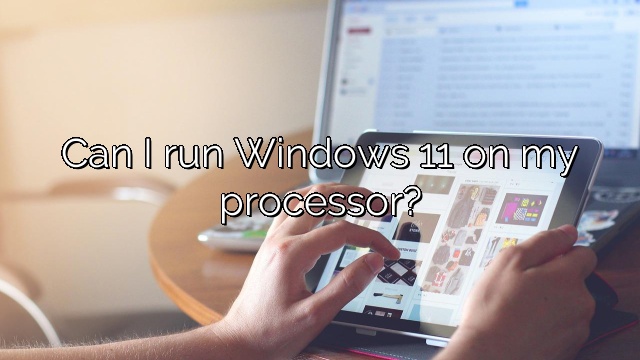
Can I run Windows 11 on my processor?
Microsoft has listed 50 processors from the Intel i3 family of processors that are compatible with the installation of Windows 11 operating system.
Is i3 processor support Windows 11?
Yes! The Intel i3 processor is compatible with the Windows 11 operating system. But Microsoft has announced that Windows 11 may not run on your Windows PC if your processor is lower than the Intel 8th generation, and will also not boot with the Cofee Lake family.
What processor do I need for Windows 11?
To install or install Windows 11 Advancement, devices must meet the following minimum hardware requirements: Processor: 1 gigahertz (GHz) or higher, with two or more cores per 64-bit processor or compatible system on a chip (SoC). RAM: 4 GB (GB) or more.
Is your i3 processor compatible with Windows 11?
Microsoft lists 50 processors from the Intel i3 processor family that are compatible with a Windows installation for operating system 11. It’s easy to tell if your i3-centric computer supports Windows 11 if the processor is older than the eighth generation of Intel processors.
Can I run Windows 11 on my processor?
If you have an Intel processor, check this Microsoft support page to see if the chip is on the compatibility list to run Windows 11. If you have an AMD processor, check this Microsoft support page to see if the chip is on the compatibility list to make Windows 11 work.
What are the system requirements for Windows 11?
Now that Microsoft says Windows 11 should have a supported processor (they went from 8th gen to 7th gen), TPM 2.0, and a UEFI BIOS. If you really don’t have these two requirements (TPM 2.0 and UEFI BIOS), chances are that Windows 11 cannot be installed on your system. I’m currently using Windows 11 on the Dev channel.
What does the term GHz mean option processor speed is measured in gigahertz or GHz which refers to the number of machine cycles per second that the processor goes through so for example a 3 GHz processor performs 3 billion machine cycles per second option
b) Processor speed is measured in gigahertz, GHz, or how fast the processor retrieves data or instructions from RAM. For example, a 3 GHz processor executes 3 billion software policies per second. … For example, a 3 GHz processor performs 3 billion or more machine cycles per second.
How does a RISC processor differ from an CISC processor is one processor type better than the other Why or why not?
RISC processors benefit from fixed length instructions. Some, but not all, CISCs use variable-length processor instructions. … A CISC processor typically uses these instructions for a long time. Regarding these differences, a RISC processor typically runs at a higher clock risk than an analog CISC processor.

Charles Howell is a freelance writer and editor. He has been writing about consumer electronics, how-to guides, and the latest news in the tech world for over 10 years. His work has been featured on a variety of websites, including techcrunch.com, where he is a contributor. When he’s not writing or spending time with his family, he enjoys playing tennis and exploring new restaurants in the area.










